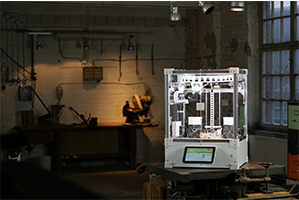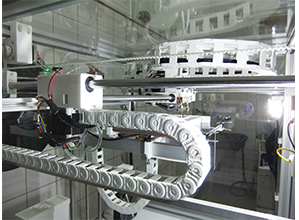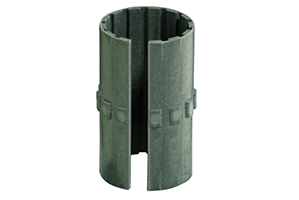3D print profits from components "made in Germany"
High running performance, lubrication free, and robust: These are the requirements that are imposed on linear components in 3D printers. In the first series-production printers of Kühling&Kühling, a company based in Kiel Germany, the appropriate special products from igus® must also be able to withstand high accelerations and temperatures of up to 80°C. In this application, high-performance plastics that make the guides fast and quiet, ensure reliable production processes and high-quality end products. The printers from Northern Germany are already proving themselves in many customer applications around the world.
System developers are driving 3D print forward
The company Kühling&Kühling, headquartered in Kiel, has been one of these system developers since 2012. The two founders, mechatronics engineers Jonas and Simon Kühling, concentrate on Open Source hardware development and production in the area of 3D printers. After one and a half years of development time, the first product, the "RepRap Industrial", has been running in series production since the end of 2013. It is a cost-effective solution for reliable, as well as high-quality rapid prototyping, particularly in high-load continuous use, emphasize the two founders of the company. The system is being further developed on a constant basis, and with version "v1.1.0" it will get a fundamental update, as well as various improvements. All materials that satisfy several basic specifications can be processed; these materials range from high-strength thermoplastics, to fibre-filled plastics and extend to rubber-elastic materials. Printers that are available for home use or model construction only permit use of a very restricted palette of print materials. For the most part, a so-called "bio-plastic" based on corn is used, which, as a rule, does not withstand the technical requirements that are imposed in industrial use. This plastic fails at temperatures over 45°C – the temperature limits in industrial applications are significantly higher. Compared with other 3D printers for industrial use the "RepRap Industrial" is recommended, primarily due to its price. The price is approximately 25 to 30% below the price of comparable systems. Their success indicates that Kühling&Kühling are on the right track: Quantities are continuously increasing and have quadrupled within one year.
All materials that satisfy several basic specifications can be processed; these materials range from high-strength thermoplastics, to fibre-filled plastics and extend to rubber-elastic materials. Printers that are available for home use or model construction only permit use of a very restricted palette of print materials. For the most part, a so-called "bio-plastic" based on corn is used, which, as a rule, does not withstand the technical requirements that are imposed in industrial use. This plastic fails at temperatures over 45°C – the temperature limits in industrial applications are significantly higher. Compared with other 3D printers for industrial use the "RepRap Industrial" is recommended, primarily due to its price. The price is approximately 25 to 30% below the price of comparable systems. Their success indicates that Kühling&Kühling are on the right track: Quantities are continuously increasing and have quadrupled within one year.

A total of twelve igus® bearing products are used in the "RepRap Industrial": Steel shafts and linear guide adapters with liners of "iglidur®" high-performance plastics for guidance of the respective axes, as well as trapezoidal lead screw units and plastic threaded nuts as axis drive. The linear slide bearings are identical to recirculating ball bearings, they are economical, and easy to install.
High-quality bought in components from Germany
The sales organization is aligned globally, however manufacturing and purchasing occur locally in Germany to the extent possible – particularly, as the components used directly influence the quality of the finished end product. In the area of linear guide components igus® GmbH from Cologne, Germany was a valued partner right from the start. Simon Kühling recalls looking for the right supplier: "When we started the system development, initially we were thinking of classic ball bearings. These have several disadvantages. On one hand, at a unit price of approximately €12 they are too expensive, on the other hand with ball bearings their utility reaches its limits at an operating temperature of 65°C. Then the gaskets start to fail and the lubrication escapes. "This took us to linear plain bearings with plastic sliding surfaces. "For cost reasons we first tested Asian products", explains Simon Kühling. "But in no way did these products meet our requirements, nor did they offer the capability of fast and long-term assured delivery. “

The currently introduced iglidur® E7 liner has been especially developed for linear motions, it has a low wear rate, and it can be installed without complications.
The "drylin®" linear technology and drive technology from igus® offers designers of 3D printers various components – always entirely lubrication free, that can be delivered within 24 hours, and starting at an order quantity of 1. Another advantage when using linear plain bearings made of high-performance plastics is quiet operation, mechanical rolling noise that occurs with metal or ceramic balls does not occur.
A total of twelve igus® bearing products are used in the "RepRap Industrial": Steel shafts and linear guide adapters with liners of "iglidur®" high-performance plastics for guidance of the respective axes, as well as trapezoidal lead screw units and plastic threaded nuts as axis drive. The linear slide bearings are identical to recirculating ball bearings, they are economical, and easy to install. Moreover, they dampen vibrations. This is all the more important, since with 3D print, although there are no significant forces, but fast accelerations do occur. For this the axis must be light.
Products from the second major business area at igus®, the plastic energy chains, are also installed in the 3D printer from Kühling&Kühling. The chains of "E2 micro" family used here are characterised by an extremely space-saving design, low weight, and extremely quiet rolling motions. Moreover, the smooth contours of the plastic energy chain protect the cables that are laid-out inside.
Economical and easy to install
For selection of the suitable components Kühling&Kühling worked closely together with igus®. For Jonas Kühling the consulting service offered by the drive specialist was an important criterion for supplier selection: "Via an online catalogue fromigus® we were able to get a good overview of the product range early on, and an overview of the products that were suitable for us. However, in order to choose the right products from the mass of possibilities the personal consulting was very helpful. “
Moreover, there was a constant exchange with regard to the limits and possibilities of individual components, and any new developments. For example, the latter applied in the area of the liners. The currently introduced "iglidur® E7" liner was specially developed for linear motions. In particular, its strength is the long service, i.e. the low wear rate on shafts of steel, chrome-plated steel, and all types of stainless steel. The operating temperature ranges from -30°C to +80°C The "E7" is offered as liner for the diameters 10 to 50 mm, and it can be combined with all "drylin® R" series of linear housings.

For selection of the suitable igus® products there was a continuous dialogue with the user occurred concerning limits and possibilities of individual products and identifying any new developments.
Advantages for a wide range of applications
Extending beyond the application in the 3D printer, for "drylin®" linear plain bearings, thanks to the large-area load distribution, as compared with that of the linear bushing, soft shaft materials can also be used. Thus the hard-coated aluminum shafts offer the best friction and wear coefficients, carbon fiber shafts, the lightest weight and stainless steel shafts, the highest chemical resistance.
Contiguous placement of linear guides is possible at all times. To do this the guide rails must merely be slightly chamfered, aligned, and simply placed one next to the other. The sliding element moves over the groove that occurs when linear guides are joined with no problems. Thus stroke lengths of more than 20 m can be implemented. Clear, factory-marked butt joints facilitate assembly.
The rolling bodies or balls that are dispensed with make drylin® linear plain bearings independent of the mass inertia of these bodies and permit high speeds of up to 10 m/s and accelerations up to 100 g. Thus the design elements are suitable for applications with light loads, for which cycle rates should be increased. Hard-coated aluminium as friction partner lowers the operating temperature in the bearing point due to its outstanding thermal conductivity. Thus you can work with a high frequency even at very short stroke travel distances. The permissible average surface speed is based on from the load on the bearings: Decreasing service load results in higher speeds.
More than 100,000 products available! Delivery and consultation Mon-Fri from 7am-8pm and Sat from 8am-12pm!